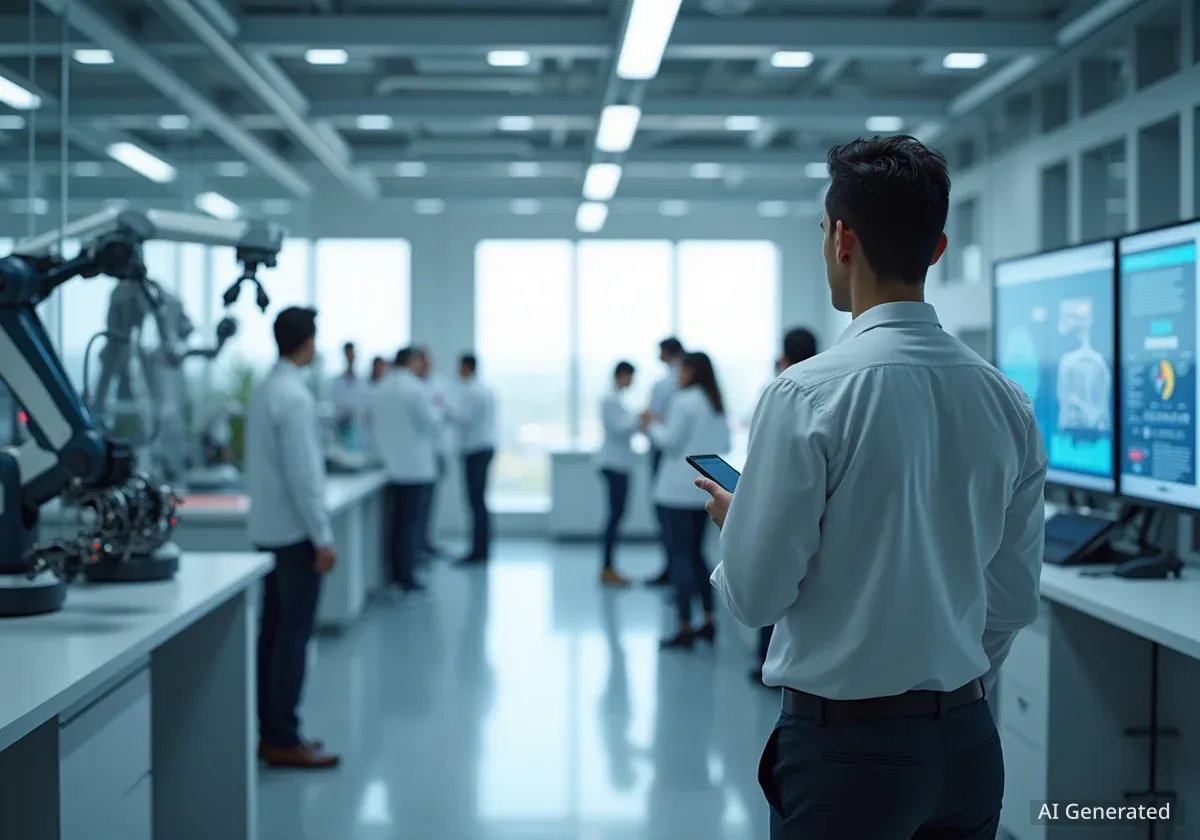Helvetia Innovations AG, a leading Swiss robotics and automation company, has officially opened its new CHF 250 million AI & Robotics Campus in the Canton of Bern. The state-of-the-art facility is expected to create over 500 high-skilled jobs and position the region as a central hub for advanced technology in Europe.
The campus, spanning 50,000 square meters, will focus on research, development, and manufacturing of next-generation automation solutions. Company officials stated the project underscores their commitment to Swiss innovation and sustainable industrial practices.
Key Takeaways
- Helvetia Innovations AG has inaugurated a new AI & Robotics Campus in the Canton of Bern.
- The project represents a CHF 250 million investment and is projected to create over 500 specialized jobs.
- The facility will integrate research, development, and advanced manufacturing of automation technologies.
- A key focus of the campus is sustainability, with plans to operate on 100% renewable energy and achieve carbon neutrality by 2030.
A Major Investment in Swiss Technology
The new Helvetia Innovations campus represents one of the most significant private investments in the Swiss technology sector in the past five years. The construction, which began in 2021, was completed on schedule and is now entering its operational phase.
The facility is designed to be a fully integrated ecosystem. It houses research laboratories, prototyping workshops, advanced manufacturing lines, and a dedicated center for client collaboration and training. This model aims to shorten the cycle from concept to market-ready product.
"This campus is more than just a building; it's a commitment to the future of technology in Switzerland," said CEO Dr. Lena Weber during the opening ceremony. "By bringing our brightest minds together under one roof, we accelerate innovation and strengthen our position on the global stage."
Boosting the Regional Economy
The creation of 500 new jobs is a significant development for the Canton of Bern. According to the company, these roles will span a wide range of fields, including software engineering, mechatronics, data science, and industrial design. The hiring process has already begun, with a focus on attracting both local and international talent.
Local economic development officials have welcomed the investment. They anticipate a positive ripple effect, with increased demand for local services, housing, and potential partnerships with regional suppliers and academic institutions.
Campus by the Numbers
- Investment: CHF 250 Million
- Total Area: 50,000 square meters
- New Jobs Created: Over 500
- Construction Timeline: 2021-2024
- Renewable Energy Goal: 100% by 2025
Focus on Sustainable Innovation
A central theme of the new campus is sustainability. Helvetia Innovations has outlined an ambitious plan to make the facility a model for environmentally responsible industry. The entire roof is covered with high-efficiency solar panels, expected to generate over 75% of the campus's energy needs.
The remaining power will be sourced from certified renewable providers. The company aims for the campus to be fully powered by renewable energy by 2025 and to achieve complete carbon neutrality in its operations by 2030.
Dr. Weber elaborated on this goal, stating, "Innovation and responsibility must go hand-in-hand. We are building the technologies of tomorrow, and we must do so in a way that protects the world for future generations."
Advanced Water and Waste Management
Beyond energy, the campus incorporates advanced systems for water conservation and waste reduction. A closed-loop water recycling system will treat and reuse water for industrial processes, significantly reducing the facility's demand on municipal resources.
A comprehensive waste management program aims to recycle or compost over 90% of all materials generated on-site. This aligns with the company's broader corporate social responsibility objectives.
The Future of Automation and Robotics
The work conducted at the Bern campus will concentrate on several key areas of technological advancement. These include artificial intelligence for industrial robotics, autonomous logistics systems, and collaborative robots (cobots) designed to work safely alongside human workers.
What are Collaborative Robots (Cobots)?
Unlike traditional industrial robots that operate in isolated safety cages, cobots are designed to physically interact with humans in a shared workspace. They are equipped with advanced sensors to avoid collisions and can be easily programmed for a variety of tasks, making automation more accessible for small and medium-sized enterprises.
One of the primary research wings will be dedicated to machine learning. The goal is to develop robots that can learn and adapt to new tasks with minimal human programming, a crucial step toward creating more flexible and efficient manufacturing environments.
Partnerships with Swiss Universities
To foster a pipeline of talent and cutting-edge research, Helvetia Innovations has announced strategic partnerships with several leading Swiss universities, including ETH Zurich and EPFL. These collaborations will include:
- Joint research projects
- Internship programs for students
- Guest lectures from company experts
- Funding for doctoral and post-doctoral research
These partnerships are intended to bridge the gap between academic theory and industrial application, ensuring that Switzerland remains at the forefront of robotics research.
The opening of the Helvetia Innovations AI & Robotics Campus marks a significant milestone for the company and for the Swiss tech landscape. It signals strong confidence in the region's talent pool and its capacity to support large-scale, high-tech industrial projects.



